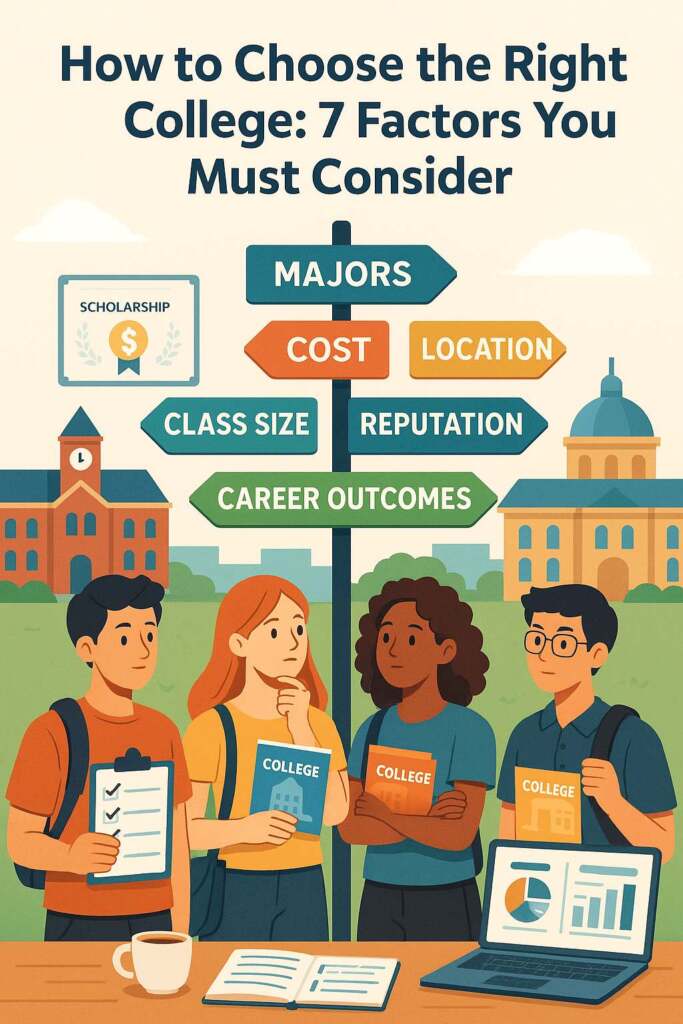Choosing the right college can be a life-defining decision, especially in 2025 when education options have become more diverse, competitive, and digitally accessible. With over 4,000 higher education institutions in the U.S. alone—and thousands more globally—students are no longer limited to geography or traditional routes. Whether you’re a high school senior, a transfer student, or returning to education after a gap, selecting the best-fit college involves more than rankings or name recognition.
This comprehensive guide walks you through the seven most critical factors you must consider when choosing a college that aligns with your goals, values, and future aspirations.
1. Academic Programs and Majors
The most obvious starting point in your search is to identify whether the college offers the program or major you’re interested in. Some institutions specialize in specific fields—such as engineering, arts, or business—while others have a more liberal arts focus.
Key considerations:
- Does the school offer your intended major or a flexible undecided pathway?
- Are there interdisciplinary programs, dual degrees, or customizable concentrations?
- What’s the faculty-to-student ratio and the reputation of professors in your field?
- Is undergraduate research, capstone projects, or co-op experience encouraged?
It’s essential to explore the curriculum depth and whether it supports your career trajectory, especially if you’re considering pre-med, law, or niche tech fields like AI and blockchain.
2. Cost, Financial Aid, and Scholarships
College costs can vary dramatically—from under $10,000 at a public in-state college to over $80,000 per year at elite private institutions. Affordability plays a huge role in your long-term financial health.
Evaluate:
- Total cost of attendance (tuition, room, board, books, fees)
- Financial aid packages (grants vs. loans)
- Availability of merit-based and need-based scholarships
- Work-study options or on-campus employment
Use the Net Price Calculator on each school’s website to estimate actual costs. Don’t overlook out-of-state tuition policies, as some states offer tuition reciprocity or regional exchange programs.
3. Location and Campus Culture
Your environment will influence your academic performance, social life, and mental well-being.
Think about:
- Urban, suburban, or rural campus?
- Climate: Can you thrive in cold winters or hot, humid summers?
- Proximity to home: Do you want to be close to family or embrace independence?
- Political, social, and cultural atmosphere on campus
- Extracurricular options, clubs, and community engagement
Visiting campuses (or taking virtual tours) and speaking to current students can provide real insights into student culture and inclusivity.
4. Career Services and Job Placement
A college is not just a place to learn; it’s a launchpad for your future. Assess how well each institution prepares you for your career.
Look for:
- Internship placement rates and employer partnerships
- On-campus recruiting and career fairs
- Resume workshops, mock interviews, and LinkedIn branding support
- Alumni mentorship programs and job networks
- Graduate school acceptance rates
Colleges with strong connections to your desired industry can open doors to opportunities even before you graduate.
5. Accreditation and Academic Reputation
Accreditation ensures that an institution meets certain standards of quality and is recognized by employers and graduate programs. Always verify that the college is regionally or nationally accredited.
Additional points to explore:
- National or global rankings in your field (but don’t obsess over them)
- Graduation and retention rates
- Honors programs or academic awards
- Partnerships with research centers or think tanks
Reputation matters but context is everything—an unranked school may have a stellar reputation in a specialized field.
6. Campus Resources and Student Support
Student success depends greatly on the quality of academic, emotional, and career support services provided.
Key services to inquire about:
- Academic tutoring, writing centers, and advising
- Mental health counseling and wellness programs
- Diversity and inclusion initiatives
- International student services (if applicable)
- Accessibility for students with disabilities
A campus that prioritizes student well-being fosters better academic performance and personal growth.
7. Alumni Network and Long-Term ROI
One of the underrated aspects of choosing a college is the power of its alumni network. A strong, engaged alumni base can offer mentorship, internships, job referrals, and even funding for entrepreneurial ventures.
Things to check:
- Alumni giving rates (indicator of satisfaction)
- Career success stories and average salaries after graduation
- Support for continuing education or career pivoting
- Presence on LinkedIn and social media
Also evaluate long-term return on investment (ROI):
- Starting salary after graduation
- Student loan debt vs. earnings potential
- Employment in your field of interest
Websites like College Scorecard and Payscale offer data-driven insights to help you assess ROI.
Final Thoughts: Don’t Let Prestige Dictate Your Decision
The “best” college isn’t necessarily the most famous one—it’s the one that fits you best academically, financially, socially, and professionally. Make a shortlist of 5–10 schools that balance reach, match, and safety.
Use a spreadsheet or college selection tool (e.g., Niche, BigFuture) to organize data, visit campuses, and trust your gut. Don’t be afraid to ask questions or negotiate financial aid packages.
The right college will empower you to explore your potential, develop lifelong friendships, and prepare you for the future you envision.

